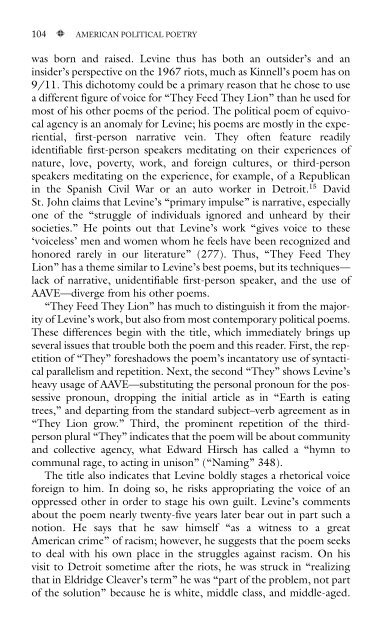american political poetry in the 21st century - STIBA Malang
american political poetry in the 21st century - STIBA Malang
american political poetry in the 21st century - STIBA Malang
You also want an ePaper? Increase the reach of your titles
YUMPU automatically turns print PDFs into web optimized ePapers that Google loves.
104 AMERICAN POLITICAL POETRY<br />
was born and raised. Lev<strong>in</strong>e thus has both an outsider’s and an<br />
<strong>in</strong>sider’s perspective on <strong>the</strong> 1967 riots, much as K<strong>in</strong>nell’s poem has on<br />
9/11. This dichotomy could be a primary reason that he chose to use<br />
a different figure of voice for “They Feed They Lion” than he used for<br />
most of his o<strong>the</strong>r poems of <strong>the</strong> period. The <strong>political</strong> poem of equivocal<br />
agency is an anomaly for Lev<strong>in</strong>e; his poems are mostly <strong>in</strong> <strong>the</strong> experiential,<br />
first-person narrative ve<strong>in</strong>. They often feature readily<br />
identifiable first-person speakers meditat<strong>in</strong>g on <strong>the</strong>ir experiences of<br />
nature, love, poverty, work, and foreign cultures, or third-person<br />
speakers meditat<strong>in</strong>g on <strong>the</strong> experience, for example, of a Republican<br />
<strong>in</strong> <strong>the</strong> Spanish Civil War or an auto worker <strong>in</strong> Detroit. 15 David<br />
St. John claims that Lev<strong>in</strong>e’s “primary impulse” is narrative, especially<br />
one of <strong>the</strong> “struggle of <strong>in</strong>dividuals ignored and unheard by <strong>the</strong>ir<br />
societies.” He po<strong>in</strong>ts out that Lev<strong>in</strong>e’s work “gives voice to <strong>the</strong>se<br />
‘voiceless’ men and women whom he feels have been recognized and<br />
honored rarely <strong>in</strong> our literature” (277). Thus, “They Feed They<br />
Lion” has a <strong>the</strong>me similar to Lev<strong>in</strong>e’s best poems, but its techniques—<br />
lack of narrative, unidentifiable first-person speaker, and <strong>the</strong> use of<br />
AAVE—diverge from his o<strong>the</strong>r poems.<br />
“They Feed They Lion” has much to dist<strong>in</strong>guish it from <strong>the</strong> majority<br />
of Lev<strong>in</strong>e’s work, but also from most contemporary <strong>political</strong> poems.<br />
These differences beg<strong>in</strong> with <strong>the</strong> title, which immediately br<strong>in</strong>gs up<br />
several issues that trouble both <strong>the</strong> poem and this reader. First, <strong>the</strong> repetition<br />
of “They” foreshadows <strong>the</strong> poem’s <strong>in</strong>cantatory use of syntactical<br />
parallelism and repetition. Next, <strong>the</strong> second “They” shows Lev<strong>in</strong>e’s<br />
heavy usage of AAVE—substitut<strong>in</strong>g <strong>the</strong> personal pronoun for <strong>the</strong> possessive<br />
pronoun, dropp<strong>in</strong>g <strong>the</strong> <strong>in</strong>itial article as <strong>in</strong> “Earth is eat<strong>in</strong>g<br />
trees,” and depart<strong>in</strong>g from <strong>the</strong> standard subject–verb agreement as <strong>in</strong><br />
“They Lion grow.” Third, <strong>the</strong> prom<strong>in</strong>ent repetition of <strong>the</strong> thirdperson<br />
plural “They” <strong>in</strong>dicates that <strong>the</strong> poem will be about community<br />
and collective agency, what Edward Hirsch has called a “hymn to<br />
communal rage, to act<strong>in</strong>g <strong>in</strong> unison” (“Nam<strong>in</strong>g” 348).<br />
The title also <strong>in</strong>dicates that Lev<strong>in</strong>e boldly stages a rhetorical voice<br />
foreign to him. In do<strong>in</strong>g so, he risks appropriat<strong>in</strong>g <strong>the</strong> voice of an<br />
oppressed o<strong>the</strong>r <strong>in</strong> order to stage his own guilt. Lev<strong>in</strong>e’s comments<br />
about <strong>the</strong> poem nearly twenty-five years later bear out <strong>in</strong> part such a<br />
notion. He says that he saw himself “as a witness to a great<br />
American crime” of racism; however, he suggests that <strong>the</strong> poem seeks<br />
to deal with his own place <strong>in</strong> <strong>the</strong> struggles aga<strong>in</strong>st racism. On his<br />
visit to Detroit sometime after <strong>the</strong> riots, he was struck <strong>in</strong> “realiz<strong>in</strong>g<br />
that <strong>in</strong> Eldridge Cleaver’s term” he was “part of <strong>the</strong> problem, not part<br />
of <strong>the</strong> solution” because he is white, middle class, and middle-aged.










